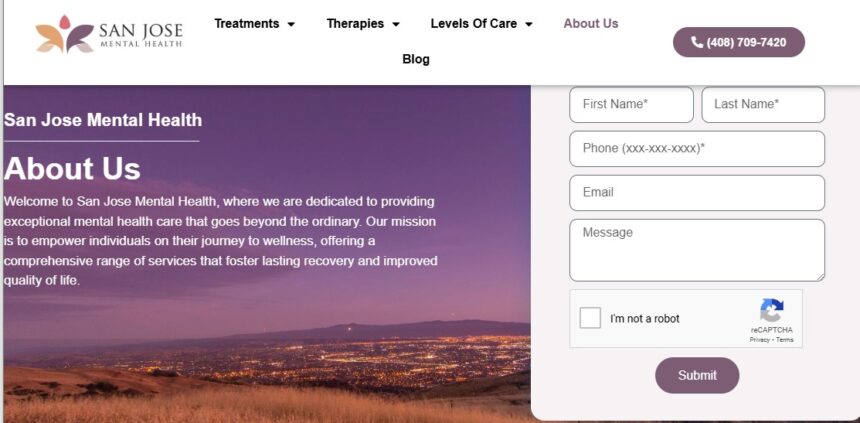Living with bipolar disorder can feel like an emotional rollercoaster—one day you’re flying high, and the next you’re crashing down. For individuals and families navigating this complex mental health condition, professional support isn’t just helpful—it’s essential. Fortunately, access to bipolar treatment San Jose is expanding, offering a lifeline of hope, healing, and holistic care.
In this blog, we’ll explore what bipolar disorder is, signs and symptoms to look out for, the most effective treatment options available, and why San Jose stands out as a hub for advanced and compassionate mental health care.
What Is Bipolar Disorder?
Bipolar disorder is a mental health condition marked by extreme mood shifts. These include emotional highs (mania or hypomania) and lows (depression). It affects around 2.8% of U.S. adults each year and can significantly disrupt relationships, career goals, and daily functioning if left untreated.
There are several types of bipolar disorder:
- Bipolar I Disorder – Characterized by manic episodes that last at least 7 days or severe mania requiring hospitalization, often followed by depressive episodes.
- Bipolar II Disorder – Involves patterns of depressive episodes and hypomanic episodes, but no full-blown manic episodes.
- Cyclothymic Disorder (Cyclothymia) – Chronic mood fluctuations that don’t meet the diagnostic criteria for full mania or depression.
- Other Specified and Unspecified Bipolar Disorders – Symptoms that don’t fit the above patterns but still involve abnormal mood elevation.
Recognising the Symptoms of Bipolar Disorder
Bipolar disorder symptoms can look different for everyone, but common signs include:
Manic or Hypomanic Symptoms:
- Excessive energy or activity
- Decreased need for sleep
- Rapid speech and racing thoughts
- Impulsivity and risky behavior
- Inflated self-esteem or grandiosity
Depressive Symptoms:
- Prolonged sadness or hopelessness
- Fatigue and low energy
- Difficulty concentrating
- Loss of interest in activities
- Suicidal thoughts or behavior
Recognising these symptoms early can be life-changing. Many people live undiagnosed for years, which often leads to worsening mental health and increased risk of co-occurring disorders such as anxiety, substance abuse, or PTSD.
Why Early Intervention Matters
Timely access to bipolar treatment in San Jose can dramatically reduce the long-term impact of this condition. Studies show that early diagnosis and a consistent treatment plan can:
- Reduce hospitalizations
- Improve overall quality of life
- Minimize suicide risk
- Help maintain stable relationships and employment
If you or a loved one is struggling, seeking care right away is one of the most powerful decisions you can make.
Treatment Options for Bipolar Disorder
There is no one-size-fits-all approach to bipolar disorder. A comprehensive treatment plan typically includes a mix of the following:
1. Medication
Medications are often the first line of defense in bipolar disorder management. Commonly prescribed options include:
- Mood stabilizers (like lithium)
- Antipsychotics
- Antidepressants (used with caution to prevent triggering mania)
A qualified psychiatrist will tailor medications based on your unique symptoms and history.
2. Psychotherapy
Therapy is a critical component of long-term stability. Evidence-based approaches include:
- Cognitive Behavioral Therapy (CBT) – Helps challenge unhelpful thought patterns.
- Interpersonal and Social Rhythm Therapy (IPSRT) – Focuses on stabilizing daily routines and relationships.
- Family-Focused Therapy – Involves loved ones in the treatment process to improve communication and support.
3. Lifestyle Adjustments
Daily routines have a huge impact on mood regulation. Recommended changes include:
- Getting adequate sleep
- Regular exercise
- Healthy diet
- Limiting alcohol and drug use
- Monitoring stress levels
4. Support Groups
Connecting with others who understand the journey of bipolar disorder can be validating and empowering. Many local San Jose providers offer group therapy or community meetups tailored for individuals with mood disorders.
Why Choose Bipolar Treatment in San Jose?
San Jose is known not just for tech innovation—but also for its mental health resources and cutting-edge psychiatric care. Here’s why this city stands out:
1. Access to Specialized Providers
You’ll find a wide range of board-certified psychiatrists, therapists, and integrated care centers dedicated specifically to bipolar disorder.
2. Holistic & Individualised Approaches
Clinics in San Jose are increasingly embracing whole-person care that looks beyond symptoms and addresses lifestyle, trauma, and co-occurring disorders.
3. Insurance & Accessibility
From private clinics to community-based services, there are options for every budget. Many facilities accept major insurance plans and offer sliding-scale fees.
4. Innovative Therapies
San Jose is home to providers who offer newer, evidence-supported treatments like:
- Transcranial Magnetic Stimulation (TMS)
- Ketamine therapy (in treatment-resistant depression)
- Telepsychiatry and virtual therapy platforms
What to Expect from a Bipolar Treatment Program
Each treatment plan starts with a thorough assessment. Expect a combination of:
- Psychiatric evaluation
- Medical history review
- Lab work (if medication is involved)
- Structured therapy schedule
- Ongoing progress monitoring
Some people benefit from intensive outpatient programs (IOP) or partial hospitalization programs (PHP), which offer a higher level of care without full-time hospitalization.
Supporting a Loved One with Bipolar Disorder
Family and friends play a huge role in the recovery process. Here are a few ways to offer support:
- Educate yourself on bipolar disorder
- Attend therapy or support groups together
- Practice active listening and avoid judgment
- Be patient—recovery is not linear
- Celebrate small wins
Boundaries are also crucial. Support does not mean sacrificing your own mental health.
When to Seek Emergency Help
While bipolar disorder is manageable, it can become dangerous during severe manic or depressive episodes. Seek emergency care if you notice:
- Suicidal thoughts or actions
- Psychotic symptoms (hallucinations, delusions)
- Aggressive or self-harming behavior
- Total loss of functioning
Don’t wait—crisis hotlines, local hospitals, and mental health centers in San Jose are available 24/7.
FAQs About Bipolar Treatment in San Jose
How do I know if I have bipolar disorder?
Only a mental health professional can diagnose bipolar disorder. If you experience extreme mood swings that disrupt your life, it’s time to seek help.
Is bipolar disorder curable?
It’s a lifelong condition, but with the right treatment, many people live full, stable lives.
What’s the cost of treatment in San Jose?
Costs vary, but many clinics accept insurance and offer payment plans or financial assistance. There are also community-based options for low-income individuals.
Can I work or go to school while receiving treatment?
Absolutely. Many programs are designed to be flexible so you can maintain your responsibilities while receiving care.
Final Thoughts: Healing Is Possible
Living with bipolar disorder can be exhausting—but with the right support, it doesn’t have to define your life. Whether you’ve just been diagnosed or have been struggling for years, help is available.
The good news? You don’t have to go far to find it. Compassionate, effective bipolar treatment San Jose services are right around the corner, ready to help you or your loved one take the first step toward stability.
If you’re ready to explore your options or simply have questions, reach out today—because your mental health is worth it.





